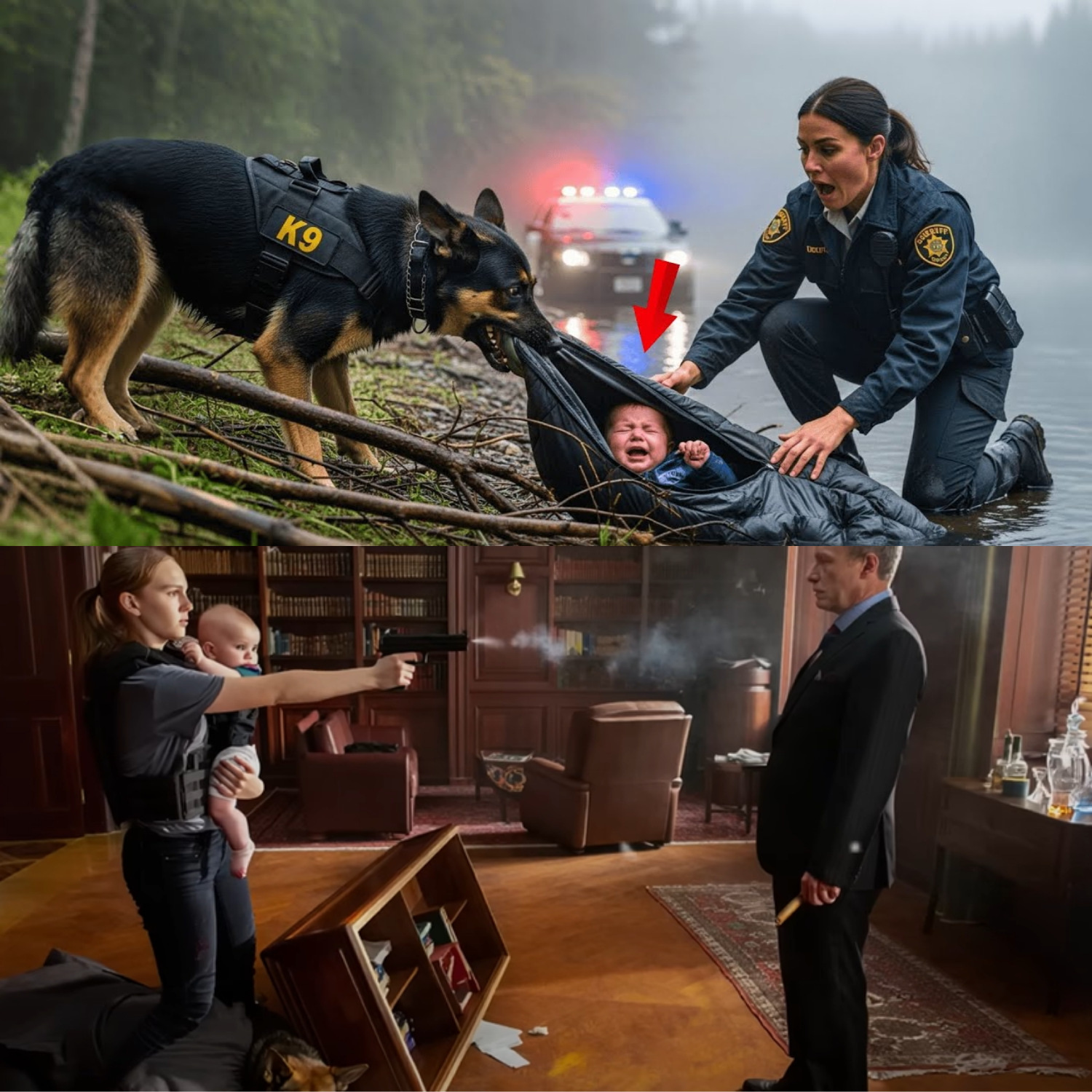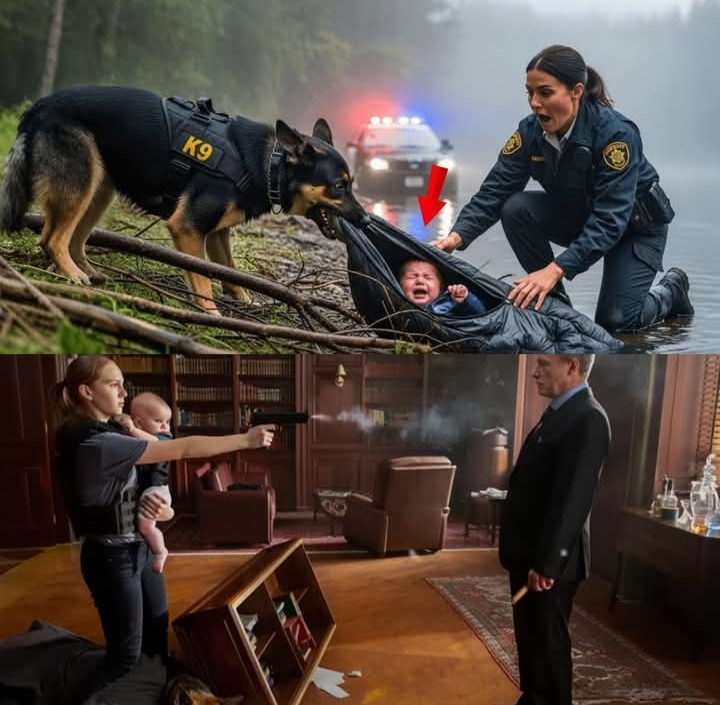K9 Dog Found a Baby in the River—And Exposed a 10-Year Genetic Cover-Up
The sleeping bag wasn’t supposed to be moving. That was Deputy Aaron Callaway’s first thought as she spotted it, bobbing awkwardly in the bend of Willow Creek, tangled in debris and tree limbs. The morning mist still clung to the water like breath on glass. Birds weren’t even up yet, but Ranger, her black and tan K-9 partner, was already growling low in his throat—not the bark of prey or fear, but the bark of instinct. “Leave it,” she whispered, tightening her grip on the leash, but Ranger didn’t listen. He never disobeyed—until now. With a sudden lunge, the German Shepherd yanked free and leapt into the river. Water exploded around him, the leash trailing like a whip. Aaron cursed, boots sinking into the mud as she scrambled after him. Ranger wasn’t chasing wildlife or fetching debris. He was pulling something. The current fought back, but Ranger fought harder. By the time Aaron reached him, the dog was dragging the soaked sleeping bag onto the riverbank, snarling, pawing, whining with a tremble in his chest she hadn’t seen since Afghanistan. Then the bag cried—a sound so faint it could have been the wind. But Aaron’s blood ran cold. It came again, wet, breathless, unmistakably human. She dropped to her knees and yanked the zipper down with shaking fingers. Inside, wrapped in a ripped towel, was a baby—blue-lipped, trembling, but alive. She cradled the infant against her chest, unsure whether to scream or sob. There had been no calls, no missing baby reports, no Amber alerts, nothing in Willow Creek, population 6,204. But this changed everything.

Back at the small-town sheriff’s station, Ranger paced, eyes locked on the baby even as paramedics swarmed in. Aaron sat against the concrete wall, soaked, her mind spinning. Where had the baby come from? The ER doctor guessed newborn—umbilical cord already gone, no bruises, no ID, nothing in the bag except a faint scent of gasoline, a single sock, and a melted plastic baby spoon. “Maybe someone got scared,” an officer offered. “Left it upstream.” But Aaron knew better. She had seen fear and desperation, and this wasn’t abandonment. This was a message. Within hours, state investigators were on their way. Reporters, too. The baby, whom nurses nicknamed Ash because he was found near burnt logs, was stable, recovering from hypothermia, but still had no name. No one came forward. No one called. No one explained how a police dog could sense a baby floating inside a zipped-up sleeping bag. That evening, while everyone else fielded media calls and wrote reports, Aaron drove alone back to the river. Ranger rode in the back seat, ears twitching with every bend in the road. She needed answers. The banks were empty now, the mud drying, the sleeping bag already bagged and tagged. But the trail didn’t end there. Ranger began sniffing the air the moment the car door opened. His posture shifted: shoulders forward, tail stiff, breath focused. “Track,” Aaron whispered, and he did—through reeds, down a dirt footpath, across the rusted remnants of a deer fence. He stopped at a clearing just twenty yards off the road and sat down. There, beneath the blackened remnants of an old campfire, lay a half-burned photograph: three people, a man, a woman, a child. All their faces melted by flame—except the baby’s. The shape of his mouth matched Ash. Aaron felt a chill dance up her spine. She took the photo back to the station, ran it through every missing person database she had. Nothing. The metadata was stripped, no location markers, no timestamp. Still, something about it nagged at her. The baby was clean—no dirt under the fingernails, no rash, no diaper rash, which was odd. Whoever had him took care of him, at least for a while. Yet the birthmark behind his ear—a strange, curved crescent—kept pulling at her thoughts. It wasn’t just rare; it was too perfect, almost manufactured.
Later that night, a nurse approached her at the hospital. Mid-40s, soft-spoken. She didn’t give her name, just a clipboard and a whisper. “I’ve seen that mark before.” Aaron froze. “Where?” The woman shook her head. “I can’t say, but check records from Westpine Clinic. The one they closed three years ago. First Serenome fertility clinic, among other things.” The next morning, Aaron drove to the edge of town where weeds had overtaken the Westpine property. The clinic had been padlocked since the scandal—funding fraud, expired meds, quiet malpractice suits. Nothing criminal had ever stuck, but locals whispered about something darker. Ranger pawed at the side door, tail twitching. Inside, the place was empty, stripped except for a crumpled file left in a drawer. A single name was circled over and over in red ink: Eliza Thornwell. Next to it, scribbled in shaky pen: “He said no one would ever know.”
That night, Aaron held baby Ash as he slept. Ranger rested on the floor, one ear raised even in dreams. The storm outside rattled the windows, but inside was a strange calm. She didn’t know where this road would lead, but one thing was clear: this wasn’t just about a lost baby. It was about a secret someone wanted buried. And somehow, her dog had dug it up from the riverbank like a bone meant to be found. The birthmark haunted her. Aaron Callaway wasn’t a woman who believed in signs, but she couldn’t stop thinking about the strange, perfect crescent behind baby Ash’s ear—too symmetrical to be natural, too intentional to ignore. In the end, it was Ranger who found the truth—a truth that would unravel a decade-long genetic cover-up and change the lives of everyone in Willow Creek forever

